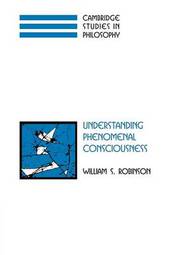
|
Understanding Phenomenal Consciousness
Paperback / softback
Main Details
| Title |
Understanding Phenomenal Consciousness
|
| Authors and Contributors |
By (author) William S. Robinson
|
| Series | Cambridge Studies in Philosophy |
|---|
| Physical Properties |
| Format:Paperback / softback | | Pages:280 | | Dimensions(mm): Height 229,Width 152 |
|
| Category/Genre | Analytical philosophy and Logical Positivism
Philosophy of the mind |
|---|
| ISBN/Barcode |
9780521122719
|
| Classifications | Dewey:126 |
|---|
| Audience | | Tertiary Education (US: College) | | Professional & Vocational | |
|---|
| Illustrations |
Worked examples or Exercises
|
|
Publishing Details |
| Publisher |
Cambridge University Press
|
| Imprint |
Cambridge University Press
|
| Publication Date |
5 November 2009 |
| Publication Country |
United Kingdom
|
Description
William S. Robinson has for many years written insightfully about the mind-body problem. In Understanding Phenomenal Consciousness he focuses on sensory experience (e.g., pain, afterimages) and perception qualities such as colours, sounds and odours to present a dualistic view of the mind, called Qualitative Event Realism, that goes against the dominant materialist views. This theory is relevant to the development of a science of consciousness which is now being pursued not only by philosophers but by researchers in psychology and the brain sciences. This provocative book will interest students and professionals who work in the philosophy of mind and will also have cross-disciplinary appeal in cognitive psychology and the brain sciences.
ReviewsReview of the hardback: 'Understanding Phenomenal Consciousness is an out-and-out defense of dualism ... against standard objections and against currently competing materialist theories of the qualitative character of experience. The view Robinson defends is provocative and should be widely discussed. The book is methodologically sophisticated and crammed with argument.' William Lycan, University of North Carolina Review of the hardback: 'Robinson's book is a highly impressive and forceful defense of a radical position in the philosophy of consciousness: ephiphenomenalistic dualism ... The clarity of the argumentation is outstanding ... The writing is lively and fresh; the background desire to advance a novel account of consciousness lends a certain 'newness' to even well trodden philosophical paths. The book is packed with careful, interesting and intriguing arguments.' William Seager, University of Toronto
|